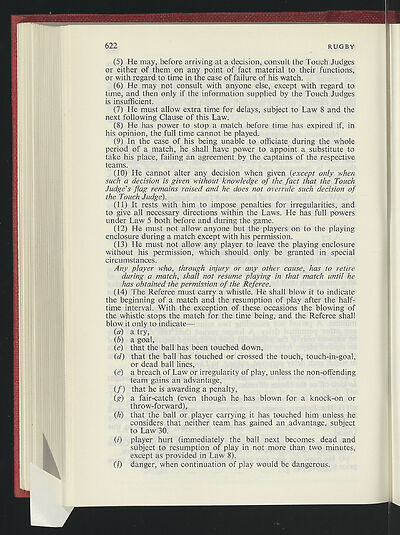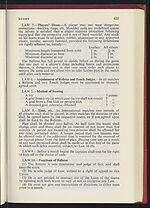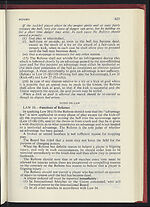1964-65
(656)
Download files
Complete book:
Individual page:
Thumbnail gallery: Grid view | List view

r•
622
RUGBY
(5) He may, before arriving at a decision, consult the Touch Judges
or either of them on any point of fact material to their functions,
or with regard to time in the case of failure of his watch.
(6)
He may not consult with anyone else, except with regard to
time, and then only if the information supplied by the Touch Judges
is insufficient.
(7) He must allow extra time for delays, subject to Law 8 and the
next following Clause of this Law.
(8) He has power to stop a match before time has expired if, in
his opinion, the full time cannot be played.
(9) In the case of his being unable to officiate during the whole
period of a match, he shall have power to appoint a substitute to
take his place, failing an agreement by the captains of the respective
teams.
(10) He cannot alter any decision when given
(except only when
such a decision is given without knowledge
of
the fact that the Touch
Judge's flag remains raised and he does not overrule such decision
of
the Touch Judge).
(11) It rests with him to impose penalties for irregularities, and
to give all necessary directions within the Laws. He has full powers
under Law 5 both before and during the game.
(12) He must not allow anyone but the players on to the playing
enclosure during a match except with his permission.
(13) He must not allow any player to leave the playing enclosure
without his permission, which should only be granted in special
circumstances.
Any player who, through injury or any other cause, has to retire
during a match, shall not resume playing in that match until he
has obtained the permission
of
the Referee.
(14) The Referee must carry a whistle. He shall blow it to indicate
the beginning of a match and the resumption of play after the half-
time interval. With the exception of these occasions the blowing of
the whistle stops the match for the time being, and the Referee shall
blow it only to indicate—
(a)
a try,
(b)
a goal,
(c) that the ball has been touched down,
(d)
that the ball has touched or crossed the touch, touch-in-goal,
or dead ball lines,
(e)
a breach of Law or irregularity of play, unless the non-offending
team gains an advantage,
(f) that he is awarding a penalty,
(g) a fair-catch (even though he has blown for a knock-on or
throw-forward),
(h) that the ball or player carrying it has touched him unless he
considers that neither team has gained an advantage, subject
to Law 30.
(i) player hurt (immediately the ball next becomes dead and
subject to resumption of play in not more than two minutes,
except as provided in Law 8).
(j) danger, when continuation of play would be dangerous.
622
RUGBY
(5) He may, before arriving at a decision, consult the Touch Judges
or either of them on any point of fact material to their functions,
or with regard to time in the case of failure of his watch.
(6)
He may not consult with anyone else, except with regard to
time, and then only if the information supplied by the Touch Judges
is insufficient.
(7) He must allow extra time for delays, subject to Law 8 and the
next following Clause of this Law.
(8) He has power to stop a match before time has expired if, in
his opinion, the full time cannot be played.
(9) In the case of his being unable to officiate during the whole
period of a match, he shall have power to appoint a substitute to
take his place, failing an agreement by the captains of the respective
teams.
(10) He cannot alter any decision when given
(except only when
such a decision is given without knowledge
of
the fact that the Touch
Judge's flag remains raised and he does not overrule such decision
of
the Touch Judge).
(11) It rests with him to impose penalties for irregularities, and
to give all necessary directions within the Laws. He has full powers
under Law 5 both before and during the game.
(12) He must not allow anyone but the players on to the playing
enclosure during a match except with his permission.
(13) He must not allow any player to leave the playing enclosure
without his permission, which should only be granted in special
circumstances.
Any player who, through injury or any other cause, has to retire
during a match, shall not resume playing in that match until he
has obtained the permission
of
the Referee.
(14) The Referee must carry a whistle. He shall blow it to indicate
the beginning of a match and the resumption of play after the half-
time interval. With the exception of these occasions the blowing of
the whistle stops the match for the time being, and the Referee shall
blow it only to indicate—
(a)
a try,
(b)
a goal,
(c) that the ball has been touched down,
(d)
that the ball has touched or crossed the touch, touch-in-goal,
or dead ball lines,
(e)
a breach of Law or irregularity of play, unless the non-offending
team gains an advantage,
(f) that he is awarding a penalty,
(g) a fair-catch (even though he has blown for a knock-on or
throw-forward),
(h) that the ball or player carrying it has touched him unless he
considers that neither team has gained an advantage, subject
to Law 30.
(i) player hurt (immediately the ball next becomes dead and
subject to resumption of play in not more than two minutes,
except as provided in Law 8).
(j) danger, when continuation of play would be dangerous.
Set display mode to:
![]() Universal Viewer |
Universal Viewer | ![]() Mirador |
Large image | Transcription
Mirador |
Large image | Transcription
| Games and sports in the army > 1964-65 > (656) |
|---|
| Permanent URL | https://digital.nls.uk/249218776 |
|---|
| Description | 'Games and Sports in the Army' was an annual publication produced by the British War Office between the 1930s and 1960s. This included the Second World War. It outlines the rules and regulations for games and sports played by members of the armed forces. It features names and photographs of team members, and examples of contemporary advertising. |
|---|---|
| Shelfmark | GWB.52 |

